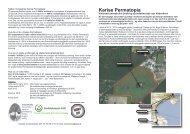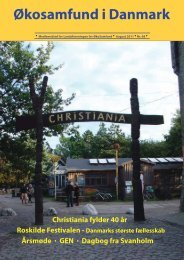- Page 1 and 2:
Hverdagslivets kritik: Økosamfund
- Page 3 and 4:
3 We’re building a home on the si
- Page 5 and 6:
ph.d.-miljø, og som ved sit eksemp
- Page 7 and 8:
Indholdsfortegnelse KAPITEL 1 INDLE
- Page 9 and 10:
MØDER OG ATTER MØDER ............
- Page 11 and 12:
Kapitel 1 Indledning ”Vores drøm
- Page 13 and 14:
ligger fordelt i Danmark, de fleste
- Page 15 and 16:
flere generationer under samme tag.
- Page 17 and 18:
vidt man mest fordelagtigt kan se h
- Page 19 and 20:
være kortlivede, en kontinuert tra
- Page 21 and 22:
for rækkevidde. Hvis man ser Utopi
- Page 23 and 24:
ninger, der står klar med svar på
- Page 25 and 26:
været fra Trinidad, via sit street
- Page 27 and 28:
er det et eksempel på en sammenfil
- Page 29 and 30:
pe mig med at forstå og belyse for
- Page 31 and 32:
Kapitel 2 Metodologiske overvejelse
- Page 33 and 34:
Tabel 1: Medlemsfællesskaber i LØ
- Page 35 and 36:
Den empiriske proces I det følgend
- Page 37 and 38:
Tabel 3: Empirisk materiale Kilde M
- Page 39 and 40:
gruppens egne medlemmer gjorde. Det
- Page 41 and 42:
estemt tidspunkt, f.eks. ”varmefo
- Page 43 and 44:
view- eller spørgeskemaspørgsmål
- Page 45 and 46:
Baggrundsspørgsmålene valgte jeg
- Page 47 and 48:
gorier. Spørgsmål om stilling og
- Page 49 and 50:
Jeg vurderede, at jeg havde to muli
- Page 51 and 52:
sammen, men igen mener jeg, at det
- Page 53 and 54:
dre fokus på at høre om undersøg
- Page 55 and 56:
formål at få bedre data (Bekin 20
- Page 57 and 58:
Kapitel 3 Præsentation af feltet D
- Page 59 and 60:
Billede 2: Rækkehuse i Munksøgår
- Page 61 and 62:
Billede 4: Cobhus under opførelse
- Page 63 and 64:
Billede 6: Pilerensningsanlæg i Fr
- Page 65 and 66:
Tabel 5: Oversigt over de undersøg
- Page 67 and 68:
hænger derfor formentlig sammen me
- Page 69 and 70:
Tabel 6: Udvalgte socioøkonomiske
- Page 71 and 72:
Kapitel 4 Økosamfund som praktisk
- Page 73 and 74:
mer af LØS - ikke mener, de er ”
- Page 75 and 76:
Retfærdiggørelsessituationer Teor
- Page 77 and 78:
sammen med Eve Chiapello siden har
- Page 79 and 80:
vendt fortegn. Boltanski og Théven
- Page 81 and 82:
Analysen forbliver på argumenterne
- Page 83 and 84:
Et grønt regime? Hvorvidt de sener
- Page 85 and 86:
humane aktører (Godard 2007). Hans
- Page 87 and 88:
økologiske eller bæredygtige ud s
- Page 89 and 90:
de forskellige fællesskaber nogle
- Page 91 and 92:
”Man vil beskytte den vilde natur
- Page 93 and 94:
af centrale ledningsnet. Flere af
- Page 95 and 96:
Infrastrukturens transportnet bygge
- Page 97 and 98:
etableringen af et kompromis mellem
- Page 99 and 100:
te regimer. Alligevel mener jeg ikk
- Page 101 and 102:
lot uden nogle af de mangler, de se
- Page 103 and 104:
Kapitel 5 Intern kritik - til møde
- Page 105 and 106:
ne (ejer)boliger på en tom storpar
- Page 107 and 108:
Dette indebar formalisering af grup
- Page 109 and 110:
passager fremhævet med mørkegrøn
- Page 111 and 112:
Analysen Som nævnt i metodekapitle
- Page 113 and 114:
planshuse kan i højere grad henfø
- Page 115 and 116:
gøre, er at servere øl og kaffe (
- Page 117 and 118:
Ønsket om et relativt stort hus be
- Page 119 and 120:
længere optræder som et led i en
- Page 121 and 122:
ne fjernvarmecentral; de kunne væl
- Page 123 and 124:
cessen: hvordan gruppen skal nå fr
- Page 125 and 126:
Lars stiller spørgsmålstegn ved D
- Page 127 and 128:
Olga: Vi skal jo trods alt bo samme
- Page 129 and 130:
David: Så det er individuel løsni
- Page 131 and 132:
Birgit fremhæver igen, at alle lø
- Page 133 and 134:
diskussionen. Det bliver etableret,
- Page 135 and 136:
Kapitel 6 Uden møder - intet fæll
- Page 137 and 138:
Den anden halvdel holder møder hve
- Page 139 and 140:
”Altså indimellem, så har det j
- Page 141 and 142:
demokrati, møderne som integrativt
- Page 143 and 144:
det være svært for to voksne menn
- Page 145 and 146:
Alle, som har deltaget i møder og
- Page 147 and 148:
gave som f.eks. at bygge en katedra
- Page 149 and 150:
Regelstyringen (som at dagsordenen
- Page 151 and 152:
At møderne også har som konsekven
- Page 153 and 154:
der sig til selve diskussionen og f
- Page 155 and 156:
Vignet: Forventninger om familieliv
- Page 157 and 158:
det tager, også fordi vi har den d
- Page 159 and 160:
en skrigende unge. Så er det jo me
- Page 161 and 162:
netop var i gang med at få små b
- Page 163 and 164:
N: Vi har også kikket på et hus,
- Page 165 and 166:
derude. Mange husdyr: Der er høns
- Page 167 and 168:
mod at kunne komme ud og hente øko
- Page 169 and 170:
Kapitel 7: Det gode familieliv i ø
- Page 171 and 172:
det, at økosamfundet er et godt st
- Page 173 and 174:
ligning med f.eks. udsagn som dette
- Page 175 and 176:
frelst eller hellig, hvilket af de
- Page 177 and 178:
deres børn kan finde kammerater. H
- Page 179 and 180:
Fællesskabet kan give de voksne fr
- Page 181 and 182:
Vinket. Men det er sådan en smuk l
- Page 183 and 184:
Også andre familier end dem, der v
- Page 185 and 186:
(Skardhamer 2008; Christensen & Kri
- Page 187 and 188:
lesskabsbevægelsens barndom var ke
- Page 189 and 190:
mest uenig; men det er så et af de
- Page 191 and 192:
e timers lønarbejde om dagen, som
- Page 193 and 194:
Kapitel 8: Social kapital i økosam
- Page 195 and 196:
spontant som en sideeffekt af andre
- Page 197 and 198:
− Praktisk naboskab − Spontan s
- Page 199 and 200:
Stordriftsfordele Det tætte lokale
- Page 201 and 202:
”At der altid er nogle der vil ly
- Page 203 and 204:
”At være omgivet af mennesker me
- Page 205 and 206: Uddannelsesforsker Tom Schuller sig
- Page 207 and 208: mindst en gang om ugen. Og kun 2 f
- Page 209 and 210: Mange forfattere ser de to i et tyd
- Page 211 and 212: ner til økosamfundets umiddelbare
- Page 213 and 214: ikke. Jeg synes, det er fedt at hav
- Page 215 and 216: Analyseenheden er vigtig at overvej
- Page 217 and 218: spørgeskemaet. Derfor har jeg valg
- Page 219 and 220: leringer, der ikke leder respondent
- Page 221 and 222: 100 80 60 40 20 0 Boligområder Øk
- Page 223 and 224: Tabel 18: Sammenhæng mellem fælle
- Page 225 and 226: cial kapital, som jeg for nemheds s
- Page 227 and 228: mod 2 % af danskerne som helhed og
- Page 229 and 230: økosamfund, hvor niveauet af forme
- Page 231 and 232: Tabel 26: Uformel social kapital: i
- Page 233 and 234: snarere vende den anden vej, idet d
- Page 235 and 236: Kontakter i nærområdet - lokal so
- Page 237 and 238: andre i økosamfundet, dels beboern
- Page 239 and 240: forventes, at børnefamilier er en
- Page 241 and 242: Derimod er der lidt overraskende in
- Page 243 and 244: ten omvendt: jo flere kontakter, ma
- Page 245 and 246: Figur 16: Økosamfundene som øer a
- Page 247 and 248: Kapitel 9 Konklusion: Kritik fra hv
- Page 249 and 250: internt og i forhold til uformelle
- Page 251 and 252: lige børn ikke tager skade af at v
- Page 253 and 254: mangfoldigheden blev lidt større.
- Page 255: til en forståelse, ikke kun af, hv
- Page 259 and 260: Dansk resumé Denne afhandling hand
- Page 261 and 262: utilsigtede og måske problematiske
- Page 263 and 264: Bates, A. 1988: “Technological In
- Page 265 and 266: Christensen, T.H., Godskesen, M., G
- Page 267 and 268: Gram-Hanssen, K., Oldrup, H.H., & O
- Page 269 and 270: Kjær, S.H. 2006: ”Det mørke kon
- Page 271 and 272: Moylan, T. 1986: Demand the impossi
- Page 273 and 274: Schwartzman, Helen B. 1989: The Mee
- Page 275 and 276: Wulf-Andersen, T. 2000: Om at ”lu
- Page 277: Figurfortegnelse Figur 1: Økosamfu





